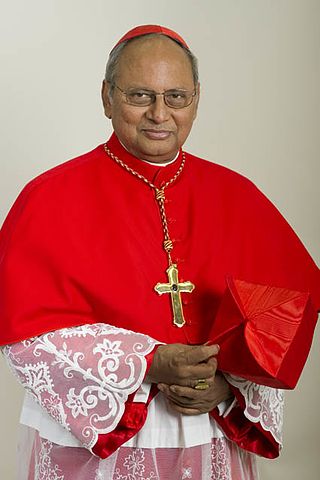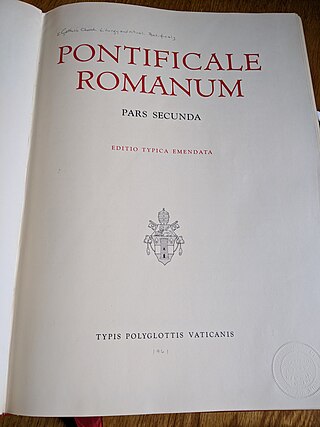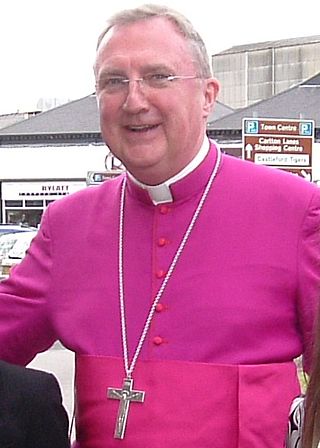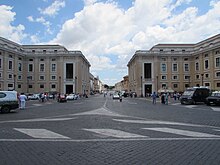
The Roman Missal is the title of several missals used in the celebration of the Roman Rite. Along with other liturgical books of the Roman Rite, the Roman Missal contains the texts and rubrics for the celebration of the most common liturgy and Mass of the Catholic Church.
The Roman Curia comprises the administrative institutions of the Holy See and the central body through which the affairs of the Roman Catholic Church are conducted. The Roman Curia is the institution which the Roman Pontiff ordinarily makes use of in the exercise of his supreme pastoral office and universal mission in the world. It is at the service of the Pope, successor of Peter, and of the Bishops, successors of the Apostles, according to the modalities that are proper to the nature of each one, fulfilling their function with an evangelical spirit, working for the good and at the service of communion, unity and edification of the Universal Church and attending to the demands of the world in which the Church is called to fulfill its mission.

The Dicastery for the Doctrine of the Faith (DDF) is the oldest among the departments of the Roman Curia. Its seat is the Palace of the Holy Office in Rome. It was founded to defend the Catholic Church from heresy and is the body responsible for promulgating and defending Catholic doctrine.

In the Catholic Church, the Dicastery for the Causes of Saints, previously named the Congregation for the Causes of Saints, is the dicastery of the Roman Curia that oversees the complex process that leads to the canonization of saints, passing through the steps of a declaration of "heroic virtues" and beatification. After preparing a case, including the approval of miracles, the case is presented to the pope, who decides whether or not to proceed with beatification or canonization.

The Dicastery for the Eastern Churches, previously named Congregation for the Oriental Churches or Congregation for the Eastern Churches, is a dicastery of the Roman Curia responsible for contact with the Eastern Catholic churches for the sake of assisting their development and protecting their rights. It also maintains whole and entire in the one Catholic Church the heritage and canon law of the various Eastern Catholic traditions. It has exclusive authority over the following regions: Egypt and the Sinai Peninsula, Eritrea and northern Ethiopia, southern Albania and Bulgaria, Cyprus, Greece, Iran, Iraq, Lebanon, Israel, Syria, Jordan and Turkey, and also oversees jurisdictions based in Romania, Southern Italy, Hungary, India and Ukraine.
An episcopal conference, sometimes called a conference of bishops, is an official assembly of the bishops of the Catholic Church in a given territory. Episcopal conferences have long existed as informal entities. The first assembly of bishops to meet regularly, with its own legal structure and ecclesial leadership function, is the Swiss Bishops' Conference, which was founded in 1863. More than forty episcopal conferences existed before the Second Vatican Council. Their status was confirmed by the Second Vatican Council and further defined by Pope Paul VI's 1966 motu proprio, Ecclesiae sanctae.

Antonio Cañizares Llovera is a Spanish cardinal of the Roman Catholic Church who was the Archbishop of Valencia from 2014 to 2022. He was prefect of the Congregation for Divine Worship and the Discipline of the Sacraments from 2008 to 2014, and archbishop of Toledo and Primate of Spain from 2002 to 2008. He was made a cardinal in 2006.

Virgilio Noè was an Italian Roman Catholic prelate and cardinal. He was elevated to the cardinalate in 1991.

Patabendige Albert Malcolm Ranjith, known as Malcolm Ranjith, is a Sri Lankan prelate of the Catholic Church who has been the Archbishop of Colombo, Sri Lanka, since 2009. He was made a cardinal in 2010.

The Roman Pontifical is the pontifical as used in Roman Rite liturgies of the Catholic Church. It is the liturgical book that contains the rites and ceremonies usually performed by bishops.

Arthur Roche is a British cardinal of the Catholic Church who has served as prefect of the Congregation for Divine Worship since 2021. He previously served as secretary of the congregation from 2012 to 2021.
Liturgiam authenticam is an instruction of the Congregation for Divine Worship and the Discipline of the Sacraments, dated 28 March 2001.
This is a glossary of terms used within the Catholic Church. Some terms used in everyday English have a different meaning in the context of the Catholic faith, including brother, confession, confirmation, exemption, faithful, father, ordinary, religious, sister, venerable, and vow.

Robert Sarah is a Guinean prelate of the Catholic Church. A cardinal since 20 November 2010, he was prefect of the Congregation for Divine Worship and the Discipline of the Sacraments from 23 November 2014 to 20 February 2021. Sarah previously served as secretary of the Congregation for the Evangelization of Peoples under Pope John Paul II and president of the Pontifical Council Cor Unum under Pope Benedict XVI.

Claudio Maniago is an Italian prelate of the Catholic Church who was named archbishop of Catanzaro-Squillace in 2021, after serving as the bishop of Castellaneta since 2014. He was previously an auxiliary bishop of Florence. He has led the liturgy programs of the Italian Episcopal Conference since 2015.
Magnum principium is an apostolic letter issued by Pope Francis and dated 3 September 2017 on his own authority. It modified the 1983 Code of Canon Law to shift responsibility and authority for translations of liturgical texts into modern languages to national and regional conferences of bishops and restrict the role of the Congregation for Divine Worship and the Discipline of the Sacraments (CDW). It was made public on 9 September 2017 and its effective date was 1 October of the same year.
Praedicate evangelium is an apostolic constitution reforming the Roman Curia and was published and promulgated on 19 March 2022 by Pope Francis; the document took effect on 5 June 2022.
Traditionis custodes is an apostolic letter issued motu proprio by Pope Francis, promulgated on 16 July 2021 regarding the continued use of pre-Vatican II rites. It restricts the celebration of the Tridentine Mass of the Roman Rite, sometimes colloquially called the "Latin Mass" or the "Traditional Latin Mass". The apostolic letter was accompanied by an ecclesiastical letter to the Catholic bishops of the world.

In the Catholic Church, preconciliar Latin liturgical rites coexist with postconciliar rites. In the years following the Second Vatican Council, Pope Paul VI initiated significant changes. Some of Paul VI's contemporaries, who considered the changes to be too drastic, obtained from him limited permission for the continued use of the previous Roman Missal. In the years since, the Holy See has granted varying degrees of permission to celebrate the Roman Rite and other Latin rites in the same manner as before the council. The use of preconciliar rites is associated with traditionalist Catholicism.














